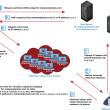Japan is one of the most connected countries in the world. Almost 91% of Japanese are connected to the Internet. Government surveillance and Internet censorship are not big problems for now; however, social attitude and some circumstances are slowly changing.
Virtual private networks are very popular in Japan. Both local residents and two million tourists that visit the country each month like to use VPNs.
A VPN is a useful software that helps to circumvent borders and unlock restricted online content. It also keeps your anonymity and privacy by encrypting the internet traffic running from and to your phone or computer. VPN drives the Internet traffic through intermediary servers in a location of your choice (where the provider has set its servers).
VPN selection criteria
As per VPNnippon, to select the best VPN for Japan, one should consider the following important factors:
- Reliability and speed of service
- No-logging policy
- Encryption protocols offered
- The number of Japanese servers
- Ability to unblocks streaming services like Netflix
- Native iOS and Android apps
- Great tech support
Using free VPNs in Japan
Many users decide not to pay for VPN services and select free versions. Free VPNs are aggressively promoted on the internet. It is not hard to find free VPNs if you dig around on search engines. Top search results will do the trick.
Please mind that there is a catch there. Free VPNs come with some limitations. You may miss some servers, encryption protocols, speed can be slower, and overall stability will leave much to be desired. If you are paying nothing, do not expect to have a high-class service.
Besides, free VPN companies still need to earn money to pay for servers, technical staff, and other expenses. To be able to earn money, free VPNs have to track users’ browsing history and insert cookies. They will then sell this data to numerous third-party advertisers.
It is also possible that you come across tons of intrusive banner ads and irritating popups. In some cases, malware may penetrate your device, adding a huge number of problems. Free VPNs represent a great example of the known fact that when you do not pay for the product, you become the product yourself.
Are torrents forbidden in Japan?
Torrenting is illegal in Japan. Violation of the law may result in extremely high penalties. Torrenting may cost you up to 10 million yen and two years in prison.
Quora and Reddit discussions suggest that it is not so dangerous to download torrents, you risk to be arrested if you upload – seed files. In 2013, 27 people were arrested for seeding games, manga, anime, and other copyright-protected materials.
The future of Internet laws in Japan
Freedom House ranked Japan’s Internet as free. Freedom House said that there are no restrictions on access to content, social media apps, or any pressure on bloggers. Japan’s constitution protects free speech and forbids censorship.
At the federal level, however, there may be some security concerns. Japanese lawmakers passed the law aimed at: “Protection of Specially Designated Secrets.” The clauses of this law forbid any leakages or publishing of information that can be considered a national secret. This law may have potential consequences for whistleblowers, journalists, and watchdogs of civil society.
The UN Human Rights Committee also agrees this legislation is broad and vague in defining the limitations of secret materials. It may lead to self-censorship by editors, journalists, and other defenders of human rights.
The law was adopted after Japan’s communication ministry issued a recommendation to begin regulating cyberspace. The guidelines intended to control what influential news websites publish and subject them to the same regulations that rule television channels and physical newspapers. In its report, the government stated that there is a strong need for active efforts from officials to make judgments as to the harmfulness of specific information as ISPs cannot always do it correctly.
It was reported that in 2016 the Japanese government took down several popular voices. Three TV news presenters were removed from their jobs. In addition, the largest liberal newspaper called Asahi Shimbun was subdued.
The above situation led to the UN’s fact-checking mission. UN reps met with educators, journalists, and some government officials. After the mission, the UN informed the world that the independence of the press in the country is facing big threats.
It was also noted that Japan’s Intelligence and Research Office tracked the movements of the fact-checking team. After the report, Japan slid to 72nd position in press freedom ranking maintained by the Reporters Without Borders organization.
All these troubling developments negatively impact the country that once prided to be the largest democracy in Asia and may poor some light on what lies in the future.
Did you enjoy reading this article? Like our page on Facebook and follow us on Twitter.









